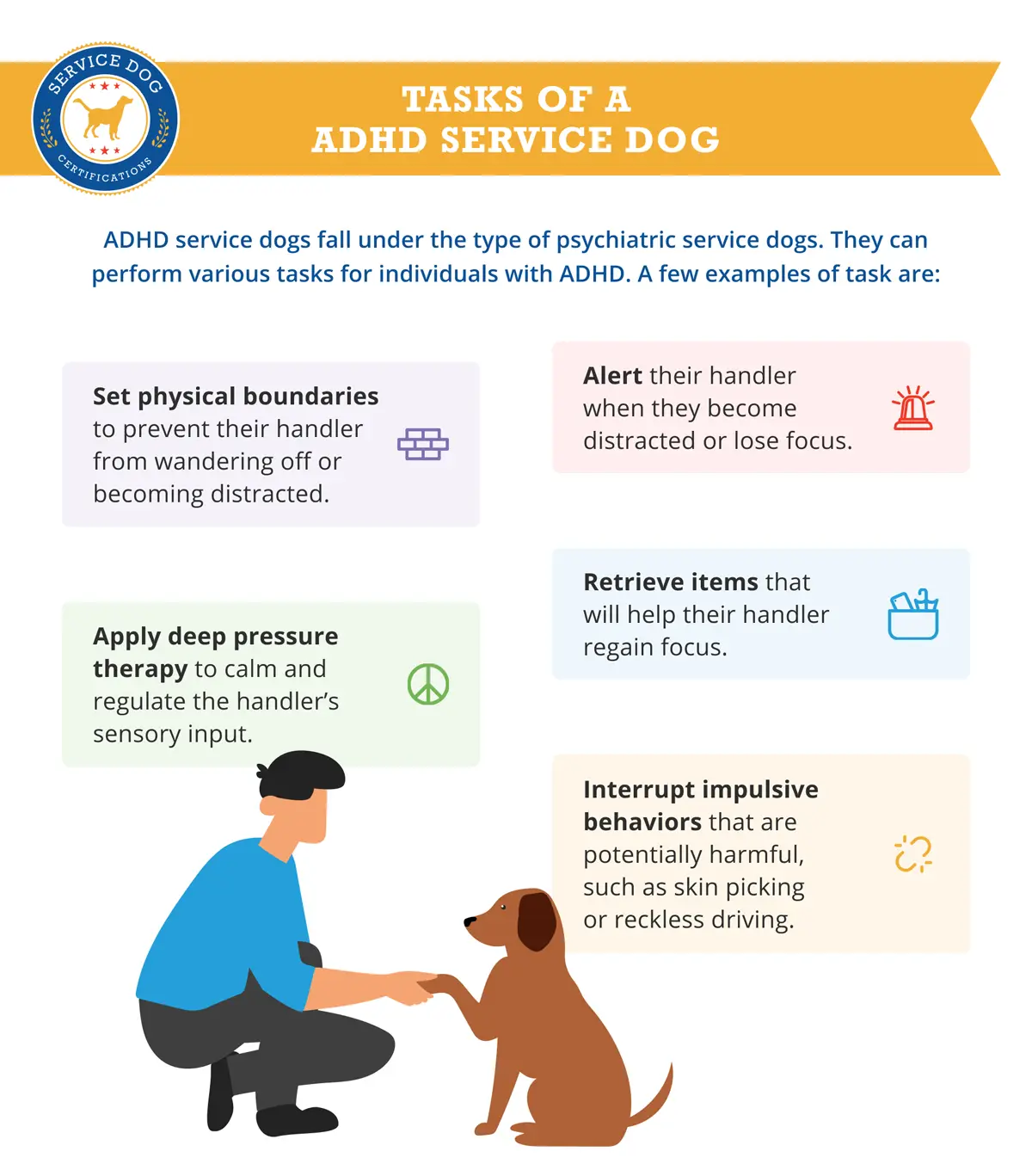ADHD Service Dog Tasks

Recently, there has been a steep increase in people diagnosed with ADHD (Attention-Deficit/Hyperactivity Disorder). One popular mode of treatment for ADHD is powerful prescription drugs that can have significant stimulatory effects.
Many people, especially parents, have raised concerns about the long-term usage of these pills. They are exploring less chemically reliant methods of addressing ADHD, including cognitive behavioral therapy, diet modification, limiting screen time, and improving sleep habits.
And the question often arises, for individuals with severe ADHD, is the assistance of a service dog another possibility?
Can someone with ADHD have a service dog?
To qualify for a service dog, a person’s health condition must be an eligible ADA disability. In the case of ADHD, the condition is so severe it substantially limits their ability to participate in major life activities.
Most people with mild ADHD who can manage their symptoms will not qualify for a service dog. However, those with severe ADHD may qualify if they also require the assistance of a trained service dog that directly helps with their condition.
What tasks can an ADHD service dog perform?
ADHD service dogs fall under the type of psychiatric service dogs (PSD). They can perform a variety of tasks for someone with ADHD:
- Alerting: Service dogs can be trained to alert their handler when they become distracted or lose focus. The dog can nudge or paw at their handler to redirect their attention back to the task.
- Deep Pressure Therapy: Service dogs can provide deep pressure therapy by leaning against or laying on their handler when they are feeling overwhelmed or anxious. The pressure can be calming and help regulate the individual’s sensory input.
- Retrieval: Service dogs can retrieve specific items for their handler, such as medication or a water bottle, to help the individual stay focused.
- Boundary Setting: Service dogs can create a physical boundary around their handler to prevent them from wandering off or becoming distracted.
- Interrupting Impulsive Behaviors: Trained service dogs can interrupt impulsive or potentially harmful behaviors, such as skin picking, hair pulling, or reckless driving.
As a bonus, service dogs also offer emotional support to their handler by providing a constant source of companionship and unconditional love.
It’s important to note that the tasks a service dog can perform for ADHD may vary depending on the individual’s specific needs and the dog’s training. It’s worth talking to your doctor or therapist about your specific needs and looking into documents like PSD letters to affirm your eligibility.

About the Author: The writing team at Service Dog Certifications is made up of folks who really know their stuff when it comes to disability laws and assistance animals. Many of our writers and editors have service dogs themselves and share insights from their own experiences. All of us have a passion for disability rights and animals.
Latest Posts

Can you bring a service dog to a museum?
Yes, you can bring your service dog to the museum! All the major U.S. museums welcome guests with service animals in accordance with the Americans with Disabilities Act (ADA). There are some areas, however, that might be off-limits. Here’s what you should know if you plan to spend a day at the museum with your […]

Read More

How to Bring a Service Dog to Six Flags Magic Mountain
Service dogs are welcome at Six Flags Magic Mountain so long as they are, according to Six Flags, “trained to do work or perform tasks for people with disabilities.” Of course, your dog must be housebroken and remain on a leash or harness and under your control while at the park — and the park […]

Read More

When Stores Can Refuse Your Service Dog
According to the Americans with Disabilities Act (ADA), service dogs should be allowed into any store most of the time. A store owner can legally exclude a service dog if they are actively growling, snapping at, or frightening customers, or if the dog is obviously out of the control of its owner. Ordinary behaviors — […]

Read More
